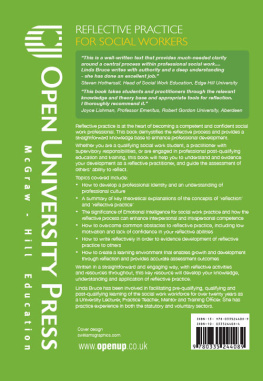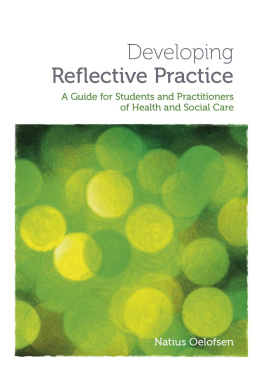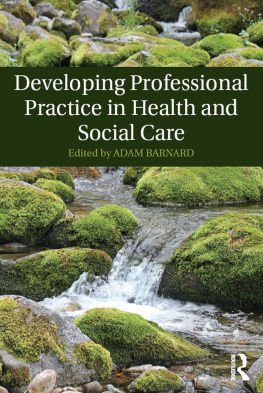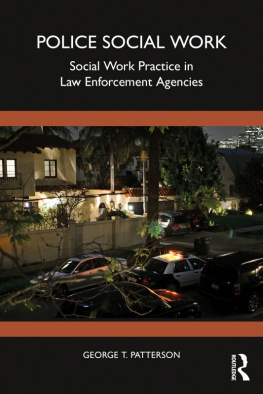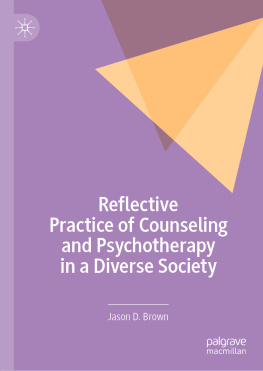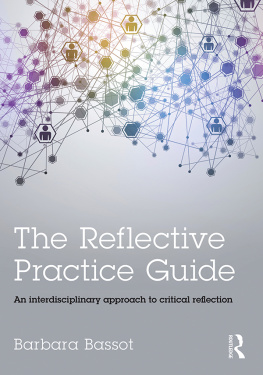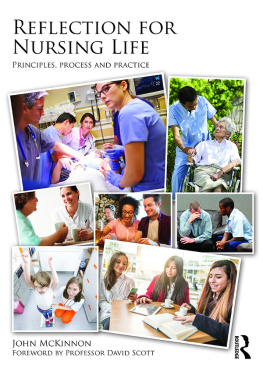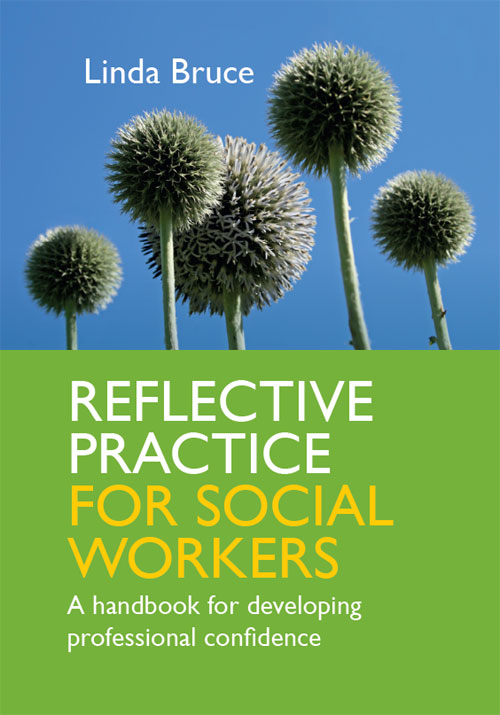
Reflective Practice for Social Workers
Reflective Practice for Social Workers
A Handbook for Developing Professional Confidence
Linda Bruce

Open University Press
McGraw-Hill Education
McGraw-Hill House
Shoppenhangers Road
Maidenhead
Berkshire
England
SL6 2QL
email:
world wide web: www.openup.co.uk
and Two Penn Plaza, New York, NY 10121-2289, USA
First published 2013
Copyright Linda Bruce, 2013
All rights reserved. Except for the quotation of short passages for the purposes of criticism and review, no part of this publication may be reproduced, stored in a retrieval system, or transmitted, in any form or by any means, electronic, mechanical, photocopying, recording or otherwise, without the prior written permission of the publisher or a licence from the Copyright Licensing Agency Limited. Details of such licences (for reprographic reproduction) may be obtained from the Copyright Licensing Agency Ltd of Saffron House, 610 Kirby Street, London, EC1N 8TS.
A catalogue record of this book is available from the British Library
ISBN-13: 978-0-335-24408-9
ISBN-10: 0-335-24408-4
eISBN: 978-0-335-24409-6
Library of Congress Cataloging-in-Publication Data
CIP data applied for
Typeset by Aptara Inc.
Fictitious names of companies, products, people, characters and/or data that may be used herein (in case studies or in examples) are not intended to represent any real individual, company, product or event.
Praise for this book
This is a well-written text that provides much-needed clarity around a central process within professional social work. Students, practitioners and managers will learn lots about how to use reflection effectively. Linda Bruce writes with authority and a deep understanding - she has done an excellent job.
Steve Hothersall,
Head of Social Work Education, Edge Hill University
This is an extremely important area of practice in the current complex world of social work practice and social care. This book takes students and practitioners through the relevant knowledge and theory base and appropriate tools for reflection. I thoroughly recommend it.
Joyce Lishman,
Professor Emeritus, Robert Gordon University,
Aberdeen
For Bill and Kim
I would like to thank the social work students, academic and practice colleagues and service user and carer participation groups I have worked with for their contribution to my own reflective journey, which made this book possible.
Thank you to the Institute for Research and Innovation in Social Services (IRISS) and the Oxford Centre for Staff Learning and Development for their kind permission to reproduce material within the book, and to Katherine, Abigail and numerous critical friends for their ongoing encouragement and support from conception to completion.
Note to the reader:
On 31st July 2012, during the completion of this book, the professional regulatory body, the General Social Care Council (GSCC), referred to in the text, was abolished. On 1st August 2012 the Health and Care Professions Council (HCPC) assumed responsibility for the regulation and registration of social workers in England, as a result of the Health and Social Care Act 2012. Social workers in England will be required to meet HCPC standards of proficiency, conduct, performance and ethics relevant to their area of practice and comply with standards for continuing professional development (CPD). Details of the HCPCs role and function can be found at www.hcpc-uk.org.
If youre browsing through this text it suggests you are looking for a resource that will help you grasp the concept and application of reflective practice. This action in itself is a positive indicator of your ability to take responsibility for your own development, a crucial first step to becoming a reflective practitioner.
This text aims to provide one key resource that will demystify the reflective process and offer an accessible and practical approach to developing your knowledge, understanding and application of reflection in practice.
Reflective practice has a central role to play in the ongoing professional development of the social work workforce and as a result is incorporated in all aspects of social work education and training from initial qualifying programmes to post-qualifying awards. The content of this text is pertinent to those experiencing their first encounter with the concept, to those revisiting the subject as a result of ongoing education and training opportunities, and to practitioners who have supervisory responsibilities for social workers in training during practice learning experiences. To capture the wide range of students who will be expected to evidence reflective practice as part of their education or training programme, the text will collectively refer to learners throughout the content, unless discussing an area that has relevance for only one group, such as social workers in training.
The content included in this text has been accumulated and developed over a number of years as a result of my responsibility for the design and delivery of the teaching and learning curriculum for this subject on both initial qualifying and post-qualifying social work education programmes.
In the role of lecturer, tutor or mentor I have found the subject of reflective practice to be an area that most learners have consistently found challenging. As a result, I have been afforded the opportunity to gather a range of useful learning resources that have enabled previous learners to effectively develop their understanding of reflective practice and become more confident in the application of their reflective skills. The purpose of this text, therefore, is to share these tried and tested resources more widely in the hope that it will help others to develop their competence and confidence as reflective practitioners. My thanks go to the many learners who have contributed to these developing teaching and learning approaches.
Social work practice is a complex task and qualified practitioners have wide-ranging professional responsibilities in many vulnerable peoples lives. Professional registration requires practitioners to continually engage in ongoing professional development through post-qualifying training and scholarly activity, creating a professional culture that recognizes the value of continuous learning throughout ones professional career.
Those joining the profession face a rigorous education and training programme designed to enable them to develop the professional knowledge, skills and values that will equip them to become competent in the roles and responsibilities they will undertake as newly qualified social workers. A feature of this rigorous training is the requirement to evidence the development of multiple professional standards and overall professional competence within a set time frame. It is not unusual for social workers in training to be focused on the assessment process, seeing the successful achievement of each assessed task as the goal required to progress through each stage of their course. For many, the integration of theory with practice can prove challenging and practice learning placements play a central role in facilitating progress in this area. Reflection, however, does not sit comfortably alongside functional requirements and standards as it requires each individual to accept and engage in a developmental process that acknowledges their uniqueness, their stage of learning, their style of learning, and their ability to self-assess. The fluidity of this process can feel at odds with the desire to develop strategies for how to successfully produce concrete evidence of skill development or professional knowledge for academic or practice learning assessment tasks.
Next page
